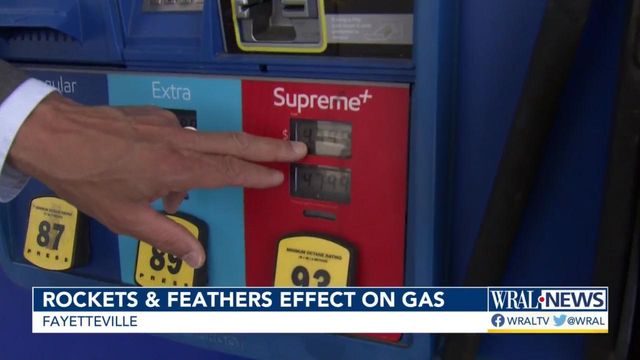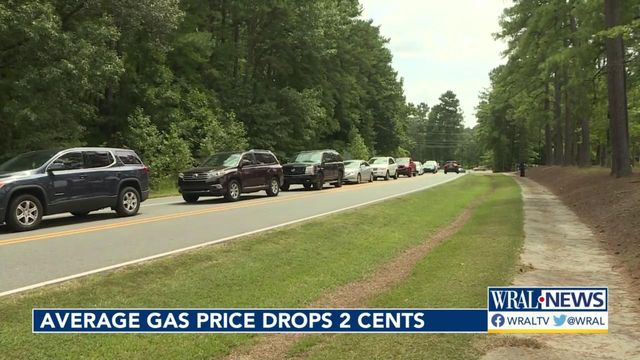Rockets and feathers: Gas prices are quick to rise, slow to come down
Gas prices are up. Way up. Drivers are spending at least $50 to fill up their tanks and most are spending more.
Posted — UpdatedConcerns about the Russian invasion of Ukraine sent oil prices soaring earlier this month, and gas prices quickly followed. Recently, oil prices have fallen to what they were before the conflict, but gas prices haven't followed.
The reason is a phenomenon energy experts describe as “rockets and feathers.” When oil prices rise, gas prices quickly follow, shooting up like a rocket. When oil prices fall, gas prices slowly come down like falling feathers.
"I filled up yesterday, actually, and it was the most expensive fill up in my life," said Cam Harvey, a professor of finance at Duke University.
He understands drivers’ frustrations when gas prices remain high, even though oil prices are dropping.
Gas companies pounce on the oil price opportunity, according to Harvey. "They’ve got the ability, given the optics, given it’s in the news to increase their price and everybody does it," he said.
Researchers with the St. Louis Federal Reserve say that a $10 rise in the price of a barrel of oil is typically correlated with around a 25-cent increase in the price of a gallon of gasoline.
WRAL Investigates examined gas and oil prices in North Carolina. Over the past month, gas prices have jumped 23% compared to just a 5% increase for a barrel of crude oil. Harvey said it doesn’t make sense.
A chart created by Gasbuddy showed that earlier this month, oil jumped and gas prices followed suit. When oil plummeted, the price of gas plateaued. That’s the rocket and feather effect.
"Ultimately, it is the vendor [cashing in] at the gas station and the oil company," he said.
When you buy gas, the station or company purchased that product weeks ago before oil prices surged. Any hike at the pump now is nothing but profit.
Retailers will keep the price of gas elevated even after the price of crude oil has decreased because consumers are already accustomed to the high prices, economists with the St. Louis Federal Reserve said.
"Since people do not tend to observe gasoline prices until they are ready to refuel their gas tanks, consumer expectations may be slow to adjust to pricing changes, allowing prices to remain relatively high," the report says.
Gas companies argue they raise prices to fund the next purchase of gasoline, assuming oil prices stay high. Historically though, that assumption usually doesn’t come to fruition as oil prices stabilize.
Oil and gas giants Shell, Chevron, BP and Exxon posted a combined $75 billion dollars in profits last year as prices at the pump continued to climb from pandemic lows of 2020.
Related Topics
• Credits
Copyright 2024 by Capitol Broadcasting Company. All rights reserved. This material may not be published, broadcast, rewritten or redistributed.






